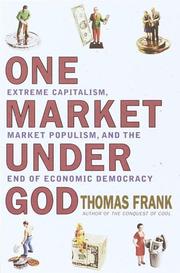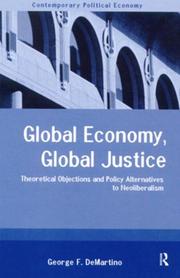| Listing 1 - 10 of 10 |
Sort by
|

ISBN: 0773522247 Year: 2000 Publisher: Montreal McGill-Queen's university press
Abstract | Keywords | Export | Availability | Bookmark
 Loading...
Loading...Choose an application
- Reference Manager
- EndNote
- RefWorks (Direct export to RefWorks)
Distributive justice --- Just war doctrine --- Walzer, Michael.

ISBN: 1861342349 Year: 2000 Publisher: Bristol, UK : Policy Press,
Abstract | Keywords | Export | Availability | Bookmark
 Loading...
Loading...Choose an application
- Reference Manager
- EndNote
- RefWorks (Direct export to RefWorks)
Distributive justice --- Equality --- Marginality, Social --- Mortality --- Health aspects --- Social aspects
Book
ISBN: 3429021898 Year: 2000 Publisher: Würzburg Echter
Abstract | Keywords | Export | Availability | Bookmark
 Loading...
Loading...Choose an application
- Reference Manager
- EndNote
- RefWorks (Direct export to RefWorks)
Distributive justice --- Jubilee (Judaism) --- Land tenure --- Land tenure --- Sociology, Biblical --- Religious aspects --- Judaism --- Biblical teaching

ISBN: 1902593413 Year: 2000 Publisher: Edinburgh : AK press,
Abstract | Keywords | Export | Availability | Bookmark
 Loading...
Loading...Choose an application
- Reference Manager
- EndNote
- RefWorks (Direct export to RefWorks)
Cooperation --- Distributive justice --- Economic policy --- Citizen participation --- Macroeconomics. --- Cooperation. --- Företagsdemokrati --- Personalinflytande --- Rättvisa --- Ekonomiska aspekter. --- Social aspects. --- Citizen participation.

ISSN: 12549991 ISBN: 2204065285 9782204065283 Year: 2000 Publisher: Paris : Editions du Cerf,
Abstract | Keywords | Export | Availability | Bookmark
 Loading...
Loading...Choose an application
- Reference Manager
- EndNote
- RefWorks (Direct export to RefWorks)

ISBN: 038549503X Year: 2000 Publisher: New York Doubleday
Abstract | Keywords | Export | Availability | Bookmark
 Loading...
Loading...Choose an application
- Reference Manager
- EndNote
- RefWorks (Direct export to RefWorks)
Economic order --- United States --- capitalisme --- politique economique --- kapitalisme --- economisch beleid --- Capitalism. --- Distributive justice. --- Kitsch. --- Marketing. --- Populism. --- Capitalism --- Distributive justice --- Kitsch --- Marketing --- Populism --- Consumer goods --- Domestic marketing --- Retail marketing --- Retail trade --- Market economy --- Political science --- Industrial management --- Aftermarkets --- Selling --- Aesthetics --- Distribution (Economic theory) --- Justice --- Social justice --- Wealth --- Economics --- Profit --- Capital --- Moral and ethical aspects --- United States of America

ISBN: 0674029666 9780674029668 0674002180 9780674002180 9780674006935 0674006933 Year: 2000 Volume: 1996 Publisher: Cambridge, Mass. Harvard University Press
Abstract | Keywords | Export | Availability | Bookmark
 Loading...
Loading...Choose an application
- Reference Manager
- EndNote
- RefWorks (Direct export to RefWorks)
This book presents G. A. Cohen's Gifford Lectures, delivered at the University of Edinburgh in 1996. Focusing on Marxism and Rawlsian liberalism, Cohen draws a connection between these thought systems and the choices that shape a person's life. In the case of Marxism, the relevant life is his own: a communist upbringing in the 1940s in Montreal, which induced a belief in a strongly socialist egalitarian doctrine. The narrative of Cohen's reckoning with that inheritance develops through a series of sophisticated engagements with the central questions of social and political philosophy. In the case of Rawlsian doctrine, Cohen looks to people's lives in general. He argues that egalitarian justice is not only, as Rawlsian liberalism teaches, a matter of rules that define the structure of society, but also a matter of personal attitude and choice. Personal attitude and choice are, moreover, the stuff of which social structure itself is made. Those truths have not informed political philosophy as much as they should, and Cohen's focus on them brings political philosophy closer to moral philosophy, and to the Judeo-Christian ethical tradition, than it has recently been.
Equality. --- Distributive justice. --- Social justice. --- Communism. --- Liberalism. --- Religion and social problems. --- Social action --- Social problems and religion --- Social problems --- Liberal egalitarianism --- Liberty --- Political science --- Social sciences --- Bolshevism --- Communist movements --- Leninism --- Maoism --- Marxism --- Trotskyism --- Collectivism --- Totalitarianism --- Post-communism --- Socialism --- Village communities --- Equality --- Justice --- Distribution (Economic theory) --- Social justice --- Wealth --- Egalitarianism --- Inequality --- Social equality --- Social inequality --- Sociology --- Democracy --- Religious aspects --- Moral and ethical aspects --- Communism --- Distributive justice --- Liberalism --- Religion and social problems --- Egalité (Sociologie) --- Communisme --- Socialisme --- Libéralisme --- Political philosophy. Social philosophy

ISBN: 1861342217 Year: 2000 Publisher: Bristol Policy Press
Abstract | Keywords | Export | Availability | Bookmark
 Loading...
Loading...Choose an application
- Reference Manager
- EndNote
- RefWorks (Direct export to RefWorks)
Distributive justice --- Poor --- -Public welfare --- -Rent (Economic theory) --- Welfare state --- #SBIB:316.8H40 --- #SBIB:93H3 --- #SBIB:012.AANKOOP --- State, Welfare --- Economic policy --- Public welfare --- Social policy --- State, The --- Welfare economics --- Economic rent --- Ground-rent --- Economics --- Land use --- Rent seeking --- Benevolent institutions --- Poor relief --- Public assistance --- Public charities --- Public relief --- Public welfare reform --- Relief (Aid) --- Social welfare --- Welfare (Public assistance) --- Welfare reform --- Human services --- Social service --- Disadvantaged, Economically --- Economically disadvantaged --- Impoverished people --- Low-income people --- Pauperism --- Poor, The --- Poor people --- Persons --- Social classes --- Poverty --- Distribution (Economic theory) --- Justice --- Social justice --- Wealth --- Government policy --- -History --- History --- Sociaal beleid: social policy, sociale zekerheid, verzorgingsstaat --- Thematische geschiedenis --- Economic conditions --- Moral and ethical aspects --- Great Britain --- Economic policy. --- Social policy. --- Distributive justice. --- Rent (Economic theory) --- Welfare state. --- History. --- Rent (Economic theory). --- Government policy&delete&

ISBN: 0415224012 0415124271 1134592809 1280400722 0203013166 9780203013168 9780415124270 9780415224017 9781134592807 9781280400728 9781134592753 9781134592791 1134592795 Year: 2000 Publisher: London Routledge
Abstract | Keywords | Export | Availability | Bookmark
 Loading...
Loading...Choose an application
- Reference Manager
- EndNote
- RefWorks (Direct export to RefWorks)
This text presents a devastating critique of the currently fashionable idea of globalisation. Using comprehensive and non-technical language this book looks at the world's cultural and value diversity, and questions whether it is possible to impose a global policy, given these differences. Topics covered include: * theories of distribution and welfare * what leads to a good economic outcome? * Egalitarian theories of welfarism * global neoliberalism and the free market culture.
Economics --- International economic relations --- Neoclassical school of economics --- Economic policy --- Distributive justice --- Liberalism --- Philosophy --- 339 --- 330.34 --- #SBIB:321H50 --- #SBIB:17H20 --- #SBIB:17H25 --- #SBIB:17H3 --- -International economic relations --- Liberal egalitarianism --- Liberty --- Political science --- Social sciences --- Distribution (Economic theory) --- Justice --- Social justice --- Wealth --- Economic nationalism --- Economic planning --- National planning --- State planning --- Planning --- National security --- Social policy --- Cambridge school of economics --- Marshallian economics --- Classical school of economics --- Schools of economics --- Economic policy, Foreign --- Economic relations, Foreign --- Economics, International --- Foreign economic policy --- Foreign economic relations --- Interdependence of nations --- International economic policy --- International economics --- New international economic order --- International relations --- Economic sanctions --- Economic theory --- Political economy --- Economic man --- Handel. Internationale economische betrekkingen. Wereldeconomie --binnenlandse als buitenlandse handel; zie ook {339.3} en {339.5} --- Economische ontwikkeling. Regionale economische ontwikkeling --- Westerse politieke en sociale theorieën vanaf de 19e eeuw: liberalisme --- Sociale wijsbegeerte: algemeen --- Sociale wijsbegeerte: economische orde en arbeid --- Politieke wijsbegeerte --- Moral and ethical aspects --- Economic Theory --- Business & Economics --- Distributive justice. --- Economic policy. --- International economic relations. --- Liberalism. --- Neoclassical school of economics. --- Philosophy. --- 330.34 Economische ontwikkeling. Regionale economische ontwikkeling --- 339 Handel. Internationale economische betrekkingen. Wereldeconomie --binnenlandse als buitenlandse handel; zie ook {339.3} en {339.5} --- Economics - Philosophy
Book
ISBN: 140082348X 140081457X 0691265771 Year: 2000 Publisher: Princeton, New Jersey : Princeton University Press,
Abstract | Keywords | Export | Availability | Bookmark
 Loading...
Loading...Choose an application
- Reference Manager
- EndNote
- RefWorks (Direct export to RefWorks)
The welfare state has come under severe pressure internationally, partly for the well-known reasons of slowing economic growth and declining confidence in the public sector. According to the influential social theorist Pierre Rosanvallon, however, there is also a deeper and less familiar reason for the crisis of the welfare state. He shows here that a fundamental practical and philosophical justification for traditional welfare policies--that all citizens share equal risks--has been undermined by social and intellectual change. If we wish to achieve the goals of social solidarity and civic equality for which the welfare state was founded, Rosanvallon argues, we must radically rethink social programs.Rosanvallon begins by tracing the history of the welfare state and its founding premise that risks, especially the risks of illness and unemployment, are equally distributed and unpredictable. He shows that this idea has become untenable because of economic diversification and advances in statistical and risk analysis. It is truer than ever before--and far more susceptible to analysis--that some individuals will face much greater risks than others because of their jobs and lifestyle choices. Rosanvallon argues that social policies must be more narrowly targeted. And he draws on evidence from around the world, in particular France and the United States, to show that such programs as unemployment insurance and workfare could better reflect individual needs by, for example, making more explicit use of contracts between the providers and receivers of benefits. His arguments have broad implications for welfare programs everywhere and for our understanding of citizenship in modern democracies and economies."For more than two decades Pierre Rosanvallon has been analyzing the development and the crisis of the 'welfare state,' combining precise, specific knowledge with philosophical and historical depth in a way that is rare among social policy analysts. [A] subtle and informed book."--From the foreword by Nathan Glazer
Welfare state. --- France --- Social policy. --- Economic policy. --- A Theory of Justice. --- Attempt. --- Begging. --- Complex society. --- Corporatism. --- Corporatocracy. --- Debt. --- Demographic transition. --- Deprecation. --- Deregulation. --- Despotism. --- Disaster. --- Disfranchisement. --- Distributive justice. --- Dynamic efficiency. --- Economic efficiency. --- Economic interventionism. --- Economics. --- Economy and Society. --- Employment. --- Expense. --- Externalization. --- Ideology. --- Impasse. --- Impossibility. --- Income. --- Indemnity. --- Individualism. --- Inferiority complex. --- Insurance. --- Internalization. --- Investment. --- Left-wing politics. --- Liberalism. --- Mercantilism. --- Modernity. --- Nanny state. --- Nationalization. --- New Issue. --- New economy. --- Obligation. --- Opportunism. --- Orwellian. --- Ostracism. --- Overextension. --- Paradox. --- Physiognomy. --- Political agenda. --- Pragmatism. --- Precedent. --- Primary goods. --- Protectionism. --- Radical Change. --- Radicalization. --- Rationing. --- Real versus nominal value (economics). --- Reexamination. --- Reform movement. --- Reformism. --- Retraining. --- Risk of loss. --- Separatism. --- Slavery. --- Social Action. --- Social Practice. --- Social actions. --- Social capital. --- Social class. --- Social conflict. --- Social cost. --- Social democracy. --- Social exclusion. --- Social history. --- Social insurance. --- Social issue. --- Social progress. --- Social protection. --- Social rejection. --- Social relation. --- Social research. --- Social revolution. --- Social theory. --- Social transformation. --- Society. --- Special situation. --- Subsidy. --- Tax. --- The Social Contract. --- Third World. --- Traditional society. --- Underclass. --- Underemployment. --- Unemployment benefits. --- Unemployment. --- Veil of ignorance. --- Welfare. --- Workfare. --- Works Progress Administration.
| Listing 1 - 10 of 10 |
Sort by
|

 Search
Search Feedback
Feedback About UniCat
About UniCat  Help
Help News
News